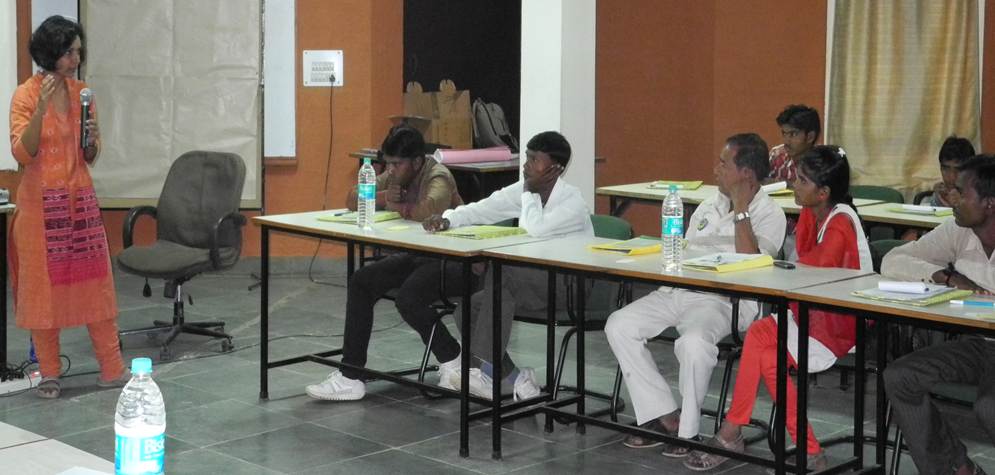|
Training Community Radio
Reporters to become
B Research also shows that simple
adaptation actions could greatly reduce the impacts of climate change in
this region. However, challenges in communicating science to the
communities lie in ways that can be easily understood by them. Inherent
here is the inability to integrate traditional knowledge of the farmers
by the scientific community and inadequate influence of voices from the
ground in policy development. This results in huge communication gaps
between the researchers, the policy makers and the communities.
To address this communication gap between the farming communities, scientists and policy makers, Development Alternatives (DA) under its ongoing climate change campaign called Shubh Kal (A Campaign for a Better Future) is implementing an innovative project - ‘From Information to Knowledge and Action’ that is funded by the Climate and Development Knowledge Network in London. This pilot project is facilitating the engagement of four existing community radios in the region (Radio Bundelkhand, Lalit Lokwaani, Chanderi Ki Awaaz and Radio Dhadkan) with climate change scientists and policy makers in order to strengthen community voices in knowledge sharing for climate change adaptation. These community radio reporters belong to the local communities of Bundelkhand. They speak in the local dialects and are well aware of the social issues of the region. However when the pilot project implementation started in the middle of 2012, most of these reporters were not completely aware of the risks and vulnerabilities associated with climate change. Additionally, they were not well trained in conducting full-fledged interviews on climate change issues, especially with experts in the field. In the months of October and November 2012, two 3-day training workshops were conducted at DA’s TARAGram campus in Orchha, Madhya Pradesh to enhance climate change journalism capacities of the community radio reporters. The objectives of the training were as follows: • To strengthen the capacity of community radio reporters, village-level volunteer reporters and print journalists (from local newspapers) to understand the impact of the changing climate on agriculture and other sources of livelihood in the semi-arid region of Bundelkhand in Central India • To build their capacity of these communities to enable them to ask the right questions to local scientific experts and policy makers (local government line department officials) regarding climate change information which can then be communicated to the community • To train the reporters to capture local concerns, knowledge and practices from the community and communicate them to local experts and policy makers, who can help in making more robust policies relating to climate-resilient development • To enhance these rural reporters’ journalistic skills and train them to create interesting and effective climate change stories Besides providing the reporters with an understanding of climate change issues both globally as well as nationally, the workshops also focussed on educating the reporters on local issues affecting the farmers in Bundelkhand. The strategy employed in the workshops included providing both theoretical and practical experience to the attending participants. The participants learned about the fundamentals of climate change journalism and were also taught to directly interact with villagers, local scientific experts and government officials to collect information. Additionally, the workshop incorporated skill enhancement through creative tasks, such as producing a radio play, pitching stories, producing short radio stories and conducting mock interviews to engage the participants in the learning process. These workshops also provided a platform for knowledge sharing and exchange of experiences between community radio reporters with different backgrounds and skills. The trainers emphasised the fact that climate journalism is not just about reporting on climate change but also about warning the masses of the adverse effects of approaching disasters. In order to effectively recognise impending environmental concerns, reporters need to be capable of identifying the emerging trends that may impact the communities they cover. This will allow radio reporters to play an important role in preparing communities before the onset of a crisis as also help communities prepare and adapt to climate change. After completing their training, the radio reporters started making climate change programmes. Starting from ‘What is the perception of the three stakeholders in this pilot project (farmers, scientists and local line department government officials) regarding climate change and its affects’, each of the four radio stations have made several shows on locally relevant themes such agro forestry, organic farming, livestock rearing, climate resilient farming, watershed management, etc. As the Project Manager, I have closely watched the progress of all these radio reporters over the last few months. It has been very interesting to see their knowledge on climate change issues increase steadily with each radio show that they have made. Their journalistic skills have also improved significantly. It is encouraging to hear them cross question the scientific experts and government line department officials while interviewing them. They are very enthusiastic about helping their communities cope with the risks of climate change by being ‘information change agents’. q Neelam Ahluwalia
|
